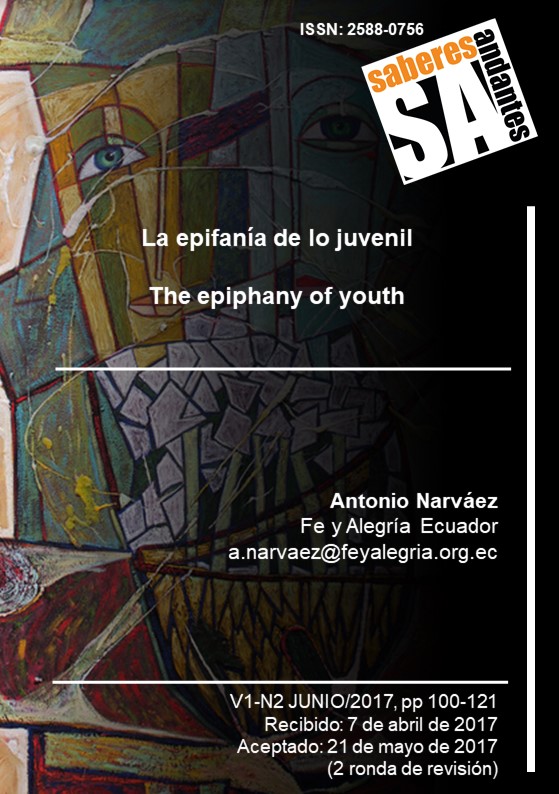The epiphany of youth
DOI:
https://doi.org/10.53387/sa.v1i2.15Keywords:
chronotope, recognition, the other, adultcentrism, panoptic time, social proscriptions, moral anticipation, generation, young, youthful, youth, urban tribes, intersubjectivityAbstract
The world of youth is a mystery; lt would seem that adults control their spaces and temporalities, but it does not stop bursting with their innovations. This study focuses on the positions with which the adult world tries to control and to understand the youthful experience from the social sciences: adultcentrism, panoptic time, social moratorium, etc. The concept of chronotope emerges as an alternative that explains the youthful experience from itself, opposing to adult-centred views. As a counterpoint, from the philosophical perspective of the recognition of the other, a re-reading of the sociological perspective of the youth experience is necessary with a broadened coverage to cover points such as the fight far recognition of youth, the gender approach and the i ntersu bjectivity.
Downloads
References
Alba, G. (1997). La generación incógnita, un decálogo sobre los jóvenes de los 90. Revista Universitas Humanística, 46, pp. 99-116.
Alvarado, S., Martínez J., Muñoz, D. “Contextualización teórica al tema de las juventudes: una mirada desde las ciencias sociales a la juventud”. En: Rev. Latinoam. Cienc.soc.niñez.juv 7(1); 83-102, 2009.
Bajtin, M. (1981).“Forms of Time and of the Chronotope in the Novel. Notes towards a Historical Poetics”, En: The Dialogical Imagination. Four Essays by M. M. Bakhtin.Austin: University of Texas Press.
Baratta, A. (1998). Criminología crítica y crítica del derecho penal. Barcelona, Siglo Veintiuno.
Dahrendorf, R. (2006). Después de la Democracia. México, D. F.: Fondo de Cultura Económica.
Durkheim, E. (1970). Los principios de 1789 y la sociología. En: La Science social et l´action. Paris: PressesUniversitaires de Frances. Traducción de Rodrigo Alzate, profesor del departamento de sociología de la Universidad Nacional de Colombia.
Foucault, M. (1976). Vigilar y castigar. México D. F.: Siglo XXI.
Fraser, N.,Honneth, (2006). ¿Redistribución o reconocimiento? Un debate político filosófico, Madrid, Ediciones Morata.
Gilbert, P. (1996).Algunos pensadores contemporáneos de lengua francesa, México, Universidad Iberoamericana.
González, G. & Caicedo, M. (1995). La intervención social en las subculturas juveniles urbanas en Latinoamérica. Ponencia presentada en el precongreso del V Congreso nacional de pedagogía Lasallista, Medellín.
Hegel, G. (2004)Fenomenología del Espíritu. México, D. F., F.C.E., 1º Ed. 15ª Reimp.
Lévinas, E. (1977)Totalidad e infinito. Ensayo sobre la exterioridad. Salamanca, Ed. Sígueme.
Maffesoli, M. (1990). El tiempo de las tribus. El caso del individualismo en la sociedad posmoderna. Buenos Aires: Siglo Veintiuno Editores.
Mannheim, K. (1961). Diagnóstico de nuestro tiempo. México, D. F.: Fondode Cultura Económica.
Merton, R. K. (1965). Teoría y estructura sociales. México, D. F.: Fondo de Cultura Económica.
Narváez, A. (Ed.). (2012).Memorias, Quito, Fe y Alegría Ecuador.
Narváez, A. (Ed.). (2013).Memorias, Quito, Fe y Alegría Ecuador.
Ricoeur, P.(2005). Caminos del reconocimiento, Madrid, Trotta.
Serrano, J. F. (2002). Ni lo mismo ni lo otro: la singularidad de lo juvenil. Revista Nómadas, 16, pp. 10-27.
Tugendhat, E. (1997).Lecciones de ética, Barcelona, Editorial Gedisa, 1997.

Downloads
Published
How to Cite
Issue
Section
License
Copyright (c) 2017 Saberes Andantes

This work is licensed under a Creative Commons Attribution-NonCommercial-ShareAlike 4.0 International License.
1. Derechos de autor
Las obras que se publican en Saberes Andantes están sujetas a los siguientes términos:
1.1. Saberes Andantes, conserva los derechos patrimoniales (copyright) de las obras publicadas, favorece y permite la reutilización de las mismas bajo la licencia Licencia Creative Commons 4.0 de Reconocimiento-NoComercial-CompartirIgual 4.0, por lo cual se pueden copiar, usar, difundir, transmitir y exponer públicamente, siempre que:
1.1.a. Se cite la autoría y fuente original de su publicación (revista, editorial, URL).
1.1.b. No se usen para fines comerciales u onerosos.
1.1.c. Se mencione la existencia y especificaciones de esta licencia de uso.








